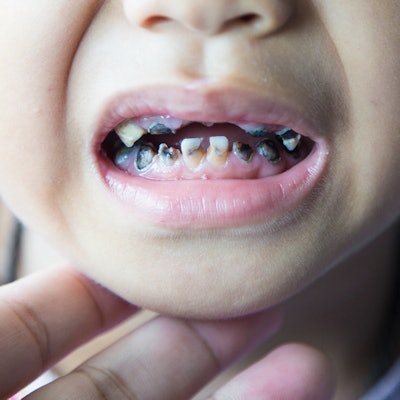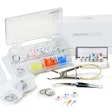
Mothers often receive conflicting information about the use of fluoride to promote healthy teeth, according to a study published in JAMA Network Open. This conflicting information, some of which is false, makes it difficult for them to make oral health decisions for their children.
The study, led by researchers at the University of Pittsburgh School of Dental Medicine, included interviews with 126 mothers of young children in Pennsylvania and West Virginia. The findings can help dental professionals better understand where parents get information about fluoride (JAMA Network Open, April 1, 2022, Vol. 5:4, e226414).
"Our study shows how difficult it is to make a decision for your child's health," lead author Dr. Jacqueline Burgette, PhD, assistant professor of pediatric dentistry, said in a statement. "As a dentist, I know that the benefits of fluoride are clear. But that message is not the only one that's being communicated to parents. When you have many conflicting messages, it can be incredibly confusing for parents to know which one is correct."
Fluoride is widely used topically and in community water fluoridation to prevent caries in children. Extensive literature has documented its safe and effective use in caries management, but there are also concerns regarding fluoride safety, the authors noted.
"Health decisions can become confusing when legitimate concerns are influenced by misinformation," the authors wrote.
To better understand where parents got their fluoride information, researchers recruited mothers of children between 3 and 5 years of age at community-based sites from 2018 to 2020. They conducted in-person interviews with 126 participants, focusing on the influence of social networks but not social media.
Interviewers collected data on open-ended questions on child dental health. Fluoride was not brought up in the initial interview guide but came up as a common topic in the interviews.
Mothers got information on fluoride from family members, healthcare clinicians, and community members. The most common source of information was family members, the study found.
Participants told interviewers that conflicting information from different connections led to difficulties in making decisions regarding fluoride. Some subjects were also concerned that fluoride use could cause cancer and other diseases.
Mothers do consider dental professionals and other healthcare clinicians as part of their social network on oral health, according to the study. Still, not all participants took the advice of medical professionals regarding fluoride usage. Some also got conflicting information from pediatricians and dentists on when to begin using fluoride toothpaste and the role of fluoride supplements.
"We might think that health decisions like using fluoride or receiving a vaccine are simple, but that's not always true," Burgette stated. "When we make an important decision about our health and the health of our children, we reach out for support to the people around us. When everyone has a different opinion, it's difficult to know who to trust, and the decision becomes less simple."
The study was not without its shortcomings. For instance, it focused on mothers in areas that lack a diverse population. The mothers were also not asked about information learned from social media.
Going forward, the authors argued that studies should look at communication and trust factors associated with fluoride information and the effectiveness of communication on the topic. Future research could also include fathers of young children.
"Good oral health starts at birth," Burgette stated. "Fluoride has incredible benefits for teeth, but that message may not be getting through at the right time -- which is early childhood."



















